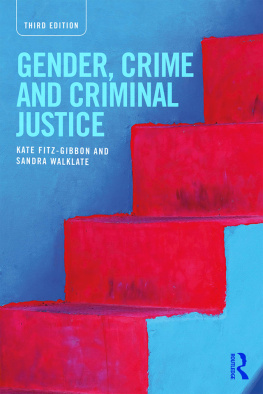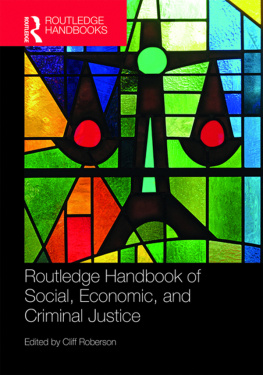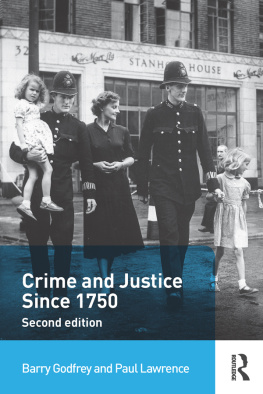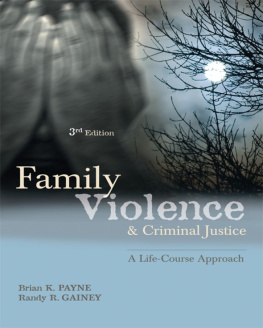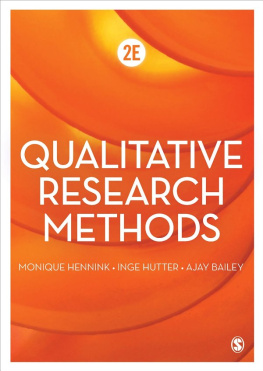
Researching Crime and Justice
This book provides an introduction to research and some of the methods in the field of crime and justice and related areas, including police, prisons and criminal justice policy making.
Less a dry how to book, it is concerned rather to provide a wide-ranging discussion that illustrates the kind of research that has been done in particular areas, the findings of previous studies, the pitfalls of real life research (and some potential solutions) and the range of possible research methods and approaches both qualitative and quantitative. It shows how appropriate methods are chosen for particular studies and explores the theoretical underpinnings of the studies, including how and why researchers use theory; the political and ethical issues; and the role of emotions such as fear and danger in researching the field of crime and criminal justice.
Key features include:
- First hand interviews with leading hands on academics
- Examples, excerpts and sources of original research
- Analysis of the theories, methods and outcomes of previous research
Throughout the book there is an emphasis on the often troublesome (and often ignored) relationship between the topic of study, desired outcomes and suitable methods, with a wide range of illustrative case studies. Here the approach is practical pointing out the different approaches various studies have used and how their outcome is often determined by their choice of methods. The book also reflects on the philosophies of research and includes discussions about the way the choice of methods will be reflected in the findings and vice versa (which seems obvious but is often forgotten).
Researching Crime and Justice: Tales from the field will be an essential source of inspiration and ideas for criminology students and other researchers on crime and justice.
Louise Westmarland is Senior Lecturer in Criminology at the Open University. She has written widely on police and policing, specifically on various aspects of police culture such as in her book Gender and Policing: Sex, Power and Police Culture (Willan Publishing 2001) and on violence and police culture, ethics and integrity. Most recently she has co-authored Creating Citizen-Consumers: Changing Publics and Changing Public Services (Sage 2007).
Researching Crime and
Justice
Tales from the field
Louise Westmarland
First published 2011 by Routledge
2 Park Square, Milton Park, Abingdon, Oxon, OX14 4RN
Simultaneously published in the USA and Canada
by Routledge
270 Madison Avenue, New York, NY 10016
Routledge is an imprint of the Taylor & Francis Group, an Informa business
2011 LOUISE WESTMARLAND
Typeset in Sabon by TW Typesetting, Plymouth, Devon
Printed and bound in Great Britain by TJ International Ltd, Padstow, Cornwall
All rights reserved. No part of this book may be reprinted or reproduced or utilised in
any form or by any electronic, mechanical, or other means, now known or hereafter
invented, including photocopying and recording, or in any information storage or
retrieval system, without permission in writing from the publishers.
British Library Cataloguing in Publication Data
A catalogue record for this book is available from the British Library
Library of Congress Cataloging in Publication Data
A catalog record for this book has been requested
ISBN 13: 978-1-84392-317-6 (hbk)
ISBN 13: 978-1-84392-316-9 (pbk)
ISBN 13: 978-0-20382-401-6 (ebk)
Contents
Preface
This book has arisen from numerous discussions about the gap between the realities of research and the practicalities of finishing (or even starting) a project. It has come from a growing realisation that while many of us can talk a good proposal the actual doing of the research can be a different matter. As a result, many of the examples in the book are based on discussions I have had with colleagues and students past and present, and experiences over the past ten years or so, especially with Dick Hobbs, John Clarke and Janet Newman. Particular thanks are due to them because the discussions and examples in the text are largely based upon real life experiences of mine or others. In fact, this is where the book is located as something slightly different from dry how to text books because it pivots on a number of interviews with real life researchers people who actually go out and get their hands dirty, collecting original data or developing new ideas about the world of crime and justice.
Throughout the book I have developed these discussions from the interviews with academic researchers who have experience in a range of crime and criminal justice fields in order to elicit their advice. In the course of a series of short interviews with key players in current criminology I have tried to relate the main points they raise about research in the real world-view. The accounts are not examples of how to do the perfect project and the interviewees do not claim to be experts on every field of criminology. What is worked through in these conversations, reproduced throughout the book, aims to provide a fly-on-the-wall experience for others who might be curious about why or how researchers and colleagues choose the methods they do. As part of these accounts I have tried to give a flavour of a warts and all description of research projects the respondents have carried out in order to try to learn from the mistakes and pitfalls of others in the attempt to avoid them for ourselves.
Due to the central importance of these interviews in the book I would first like to thank the interviewees in order of appearance: John Muncie, Ben Bowling, Laura Piacentini, Sandra Walklate, Lynn Hancock, Rob Hornsby and Simon Winlow. It goes without saying that without them this project would have been a much less entertaining and interesting exercise, and the book would not have been written. I would like to thank them not only for giving up their time but also for being so accommodating and enthusiastic about the whole project and the idea behind it. Second, I would like to thank my colleagues and friends at the Open University, especially Deborah Drake, Reece Walters, John Clarke and all the people in the Department of Social Policy and Criminology who have listened to my woes while writing this book. Once again I would like to thank Brian Willan for being, as ever, a great publisher of extreme patience and also Julia Willan for being so encouraging and sympathetic when deadlines have slipped.
Finally I would like to thank my partner Paul for his patience and cups of tea and coffee, without which this book would never have been completed, and my family, parents and daughters Nicole and Amy.
1 Problematising criminological
research
Introduction
This book is intended to be an informative and sometimes comforting yet often disconcerting introduction to research in the field of crime and justice. It has not been written as a how to handbook but rather as an inspiration, source of ideas, and hopefully an interesting journey around the area of what is broadly termed criminology. The main type of information it contains is to do with the nuts and bolts of various methods employed by researchers. These workings are illustrated using a series of first-hand accounts, in the form of interviews with leading hands on academics, as well as examples, excerpts and sources of original research. The idea of the various chapters is to explore the way research happens in real life and to analyse the various theories, methods and outcomes of previous research. Reflections of the key academics whose wise words are reproduced as interviews throughout the text are intended to be enlivening and inspirational, as well as comforting as they explain how things went wrong during their projects, and how they put things back on course.


